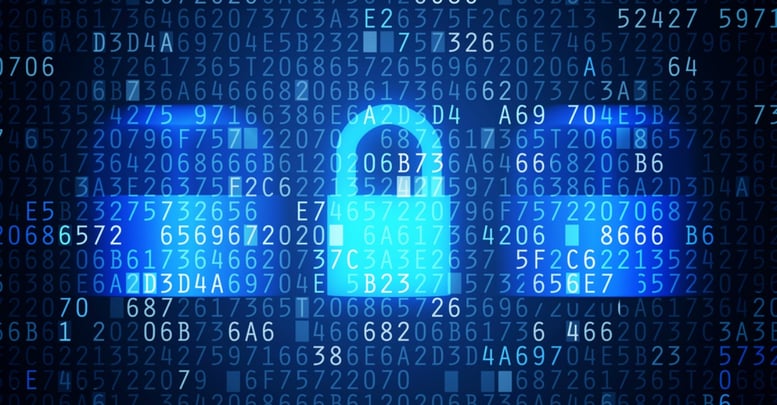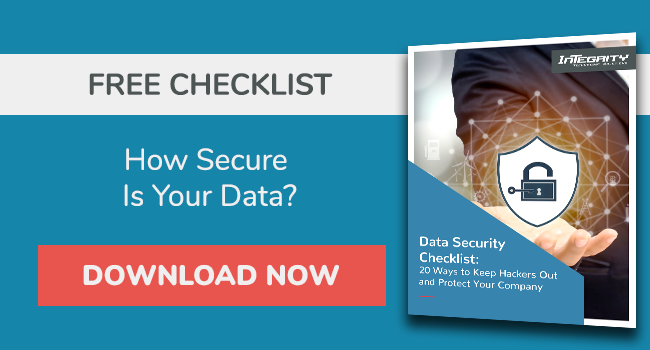Blog
15 Tips For National Cybersecurity Awareness Month

October is National Cybersecurity Awareness Month! It's the perfect time to examine your company's tech security practices and make any and all improvements to ensure that your business is protected. Review the tips below and identify where your security could use some reinforcement:
1. Set Smart Passwords
A strong password (long, complex, difficult to guess) is the first line of defense against cyber threats. Using the same password for multiple log-ins, weak passwords (short, easy to guess), and careless password storage can all make a hacker's life easier.
SEE ALSO: Sign up for a free Tech Security Consultation today
2. Use Two-Factor Authentication
Whenever possible, opt for two-factor authentication. By simply adding an additional credential set, you're making it instantly twice as difficult for a criminal trying to access private information. Criminals like to prey on the weak and are likely to look elsewhere, when met with multiple authentication.
3. Consider a Password Manager
Using a password manager or vault is an effective way of storing all your passwords without needing to write them down (which can, itself, be stolen) or remember them (not an easy task with strong passwords).
4. Beware of Phishing Scams
Phishing relies on the good and trusting nature of people to steal company data. People are often the weakest link in cybersecurity. Sadly, criminals know this and devise scams around cultivating fear, panic, and taking advantage of emotion. Phishing is a criminal posing as a trusted source and asking for private information. Confirm identities before sending private data.
5. Install Anti-Virus Software
Like passwords, installing reputable anti-virus software and keeping it updated isn't flashy. But, it is effective. Without it, your computers and network are susceptible to otherwise avoidable viruses.
6. Don't Leave Devices Unattended
Something most don't think about: don't leave your devices unattended. If your device holds company data, keep it on you at all times. It takes little time to steal data (or the entire device) and you never know who is lurking nearby. If nothing else, lock your devices whenever you're not using them.
7. Be Wary of Public WiFi
Always use a VPN when using public WiFi. Even if the network appears trustworthy, accessing private company data on a public WiFi network is a recipe for disaster. Without encryption, sensitive data can be stolen in an instant.
8. Steer Clear of Unknown Attachments
As a general rule, don't click on any attachment that you're not 100% sure of. Often, attachments can appear harmless, but contain a virus that's deliberately designed to exploit carelessness (like a criminal posing as a company or government agency in an e-mail). When in doubt, don't click.
9. Prepare Against Ransomware
Ransomware is rising sharply and most businesses aren't prepared. Infiltration happens through an e-mail attachment and other methods. Once the virus takes hold, it locks up the computer and its sensitive data. To get the data back, a ransom is posted. Do not pay it. There is no guarantee the data will be released. Instead, use a backup system to preserve data.
10. Update All Software
Yes, updates can be annoying. But, they're important to the security of your computer and network. Many updates contain security patches. By ignoring the update, you're needlessly weakening your defenses and opening yourself up to cyber threats.
11. Encrypt Everything
From correspondences, to documents, to anything else that qualifies, encrypt. Encryption is another way to thwart criminals and make your business an unappealing and time-intensive target.
12. Protect Your Workspace
Similar to protecting your devices, protect your workspace. Don't write passwords down and display them in the open. Don't leave documents containing data or credentials lying around. Take care to make sure that anyone trying to steal information will have an exceedingly hard time.
13. Have a Disaster Recovery Plan
Having a thorough and mapped-out DR plan will help your business protect against ransomware and other criminal incidents. By backing up data and having a plan of action for restoring it, you're getting ahead of some threats.
14. Educate on Cybersecurity Awareness
If Cybersecurity Awareness is a priority, your company will be safer. A little knowledge (like how to spot something suspicious) can help employees avoid mistakes and keep sensitive data from falling into the wrong hands.
15. Practice Security Vigilance
In conjunction with everything above, instilling security vigilance in your company will have a hugely positive effect. Good general security practices can include a healthy dose of skepticism towards unknown or suspicious online activity, smarter computing, and a more consistent adherence to the tips above.
National Cybersecurity Awareness Month is the ideal time to evaluate your company's tech security and make the necessary changes. With cyber threats on the rise, top-notch security has never been more important.
Download our FREE Data Security Checklist today and evaluate your business further:
Read On
Integrity Technology Solutions Recognizes Cybersecurity Awareness Month With Commitment To Online Safety And Education
Bloomington, IL — Oct. 1, 2025 — Integrity Technology Solutions is proud to announce its...
CAT Sunset: What The August 2025 Deadline Really Means For Financial Institutions
If you built your cybersecurity program around the FFIEC Cybersecurity Assessment Tool (CAT), you...
Gone Phishing: How To Avoid The Greatest Cybersecurity Scam
More people fell victim to phishing and spoofing scams in 2024 than any other cybersecurity threat,...


Leave a Reply